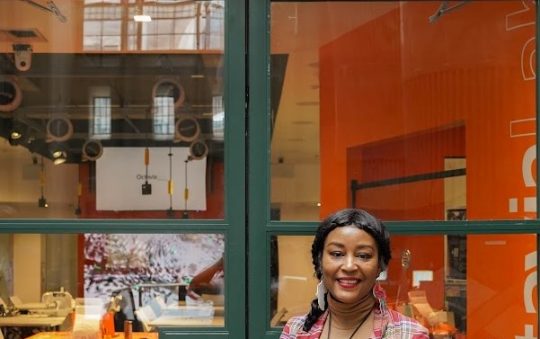
Kevin Merida has served as senior vice president and editor-in-chief at ESPN overseeing The Undefeated, ESPN’s digital platform that focuses on the intersections of race, sports and culture. Prior to that, he served as managing editor at the Washington Post, directing all news and features coverage and digital transformation.
In 2021, he was named executive editor of the Los Angeles Times, which recently won Pulitzer Prizes for coverage of two of the most troubling problems facing Southern California – homelessness and racial division.
The L.A. Sentinel spotlights Executive Editor Merida for Black Men’s Month. Recently, approximately 65 invited guests gathered for a speaker’s forum at The California Club located downtown. They came to hear the ‘Future of Journalism’ from Kevin Merida.
Related Links:
https://lasentinel.net/armstrong-keys-to-success-for-black-mens-appreciation-month.html
The event was presented by the Los Angeles World Affairs Council and Town Hall and jointly sponsored by the Society of Professional Journalists and Preferred Bank. Tracy Williams, president and CEO of Olmstead-Williams Communications, moderated the lunch discussion. What does it mean to win the Pulitzer Prize for breaking news reporting?
“You don’t win big prizes if you’re not doing the work consistently every day. [The prizes] reflect careful, sophisticated, nuanced reporting and photography on complex topics important to Angelenos: power, representation, race relations, and homelessness.”
The recent layoffs at the Times were shocking.
“Our digital subscriptions, direct sales and Apple News advertising have taken a big hit since the pandemic. We were struggling, and had to make tough decisions resulting in some good people losing their jobs. Those decisions were made more urgent by the economic climate and the unique challenges of our industry.”
How are you covering Donald Trump?
“Holistically, we’re fact-checking in real-time, and combining selective planning with independent, thoughtful, and rigorous investigative reporting. You can’t go down a rabbit hole and believe everything you hear. Journalism is a pillar of democracy. Without it, there would be chaos.”

How are you staying relevant in the digital era?
“Our focus is on where we can have an impact and curate expertise. We have a presence in Latin America, the Pacific Rim, and China. But we know the people here, and they know us because we’re anchored here.”
How are you managing digital assets?
“Our craft has expanded into new roles like Data Specialist, embedded video teams, and data collection. We’re still exploring the impact of deploying Artificial Intelligence into our content creation, and using it responsibly.”
Talk about ethics.
“We have guidelines in place on how to behave in the newsroom. I drafted similar ones while at ESPN. Transparency, doing no harm [in covering sensitive reporting], and doing nothing to hurt your colleagues. How we’re perceived is important.”
What weighs more today: graduate work or professional certification?
“It all depends on the individual, their career goals, and the graduate school itself. But I think your work speaks loudest for you. With work, you can demonstrate accomplishment, highlight your skills, and show your potential.”
Who has had the greatest impact on you?
“My dad was a paleontologist. He just liked rocks! My mom worked for the National Science Foundation. My aunt was a teacher, and [journalist] Bob Maynard of the Maynard Institute helped pave my way. I learned never to look past people. Everyone’s important. The influence of my family is always in the back of my mind.”
The Los Angeles World Affairs Council and Town Hall is the largest speaker’s forum in Southern California, focusing on educating Angelenos on the most current international, domestic, and regional affairs.
For more information, visit http://www.townhall-la.org/ https://www.spj.org/.
Links: https://bit.ly/461pIKO






